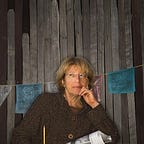INFATUATION AND MY FIRST SALON
Everyone experiences an infatuation, whether with a glamorous, Photoshopped celebrity, or the high school homecoming queen or king.
Infatuation is a form of fantasy, but sometimes the dream can become a reality, which happened when I was nineteen, a senior at Reed College in Portland, Oregon.
In 1966, before the beginning semester of my last year, Sheila Klatzky, another classmate under the spell of our sociology professor, J.C. Pock, and I rented a rickety, one-bedroom house a short bike ride away from the college in southeast Portland. We agreed that Sheila would have the bedroom, and I would sleep in the living room on a secondhand mattress that shed bits of stuffing each night, but we’d trade beds when I had a boyfriend over. That happened only once.
With both of us trying to survive on scholarships, we couldn’t afford to turn on the heater more an hour a day, so on weekends, when we were at home deconvoluting arcane texts by Harvard sociologist Talcott Parsons, we plugged in a 30-cup coffee urn and drank cup after cup of waterweak grounds to keep warm.
In those pre-MeToo-movement days, only 25 percent of the students at Reed were women. You’d think that would increase our chances of mating with the boys, but that was the problem: they were boys, whereas Sheila and I always felt our level of maturity was at least a decade more advanced than the puberty level of some of our peers.
I don’t know who came up with the idea, but it seemed an exemplary Reedie way to bid farewell to Galen Cranz, another disciple of J.C. who was about to continue her studies at the University of Chicago.
“Why don’t we invite all the sexiest male professors and ask them to come alone….without their wives or partners?” I asked Sheila.
In these pre-Tinder times, more than a handful of Reed College professors met our lust-driven specifications: in particular, Galway Kinnell, Poet in Residence and later winner of the Pulitzer Prize for Poetry. Tall, with a shock of black lanks barely shielding the intensity of his Byronic gaze, he looked like what I had imagined the stonemason might have resembled in Lady Chatterley’s Lover. He was married, of course, but that only boosted his desirability because it meant he had already proven lustworthy.
We invited six professors, all male, all handsome, and of course, all married (unhappily for some as it later turned out), except for the Victorian literature professor who always wore black and was presumedly gay (which was not a big deal since Reed had a separate dorm for gay men, and a group of gay women lived in a house off campus).
Our handwritten and hand-delivered invitations announced that the party started at 10 p.m. And we specified that the invitee had to come alone. We might have even mentioned the word salon in the invite although I’m not sure.
By 10:30 p.m., five of the objects of our infatuation had arrived, and we were engaged in what was my first salon, one Madame Emilie de Stael, the mistress of the literary salon, might have held in the late 18th century before Napoleon exiled her from France because he didn’t like women smarter than him. (That doesn’t say much for Josephine.)
As the night wore on, we doubted we’d ever see the prize — our Poet in Residence. At the stroke of midnight, like a knight from some English novel we’d been required to read in Humanities 210, Kinnell quietly opened the unlocked door and strode into our shabby abode — where my herniated mattress doubled as a couch.
Sheila and I gasped. Galen, the only other female, remained calm as Kinnell loped toward her like a perfect hole-in-one. Galen — with a thick waterfall of naturally gold hair and an unblemished pale complexion — was our Reed replica of Venus rising from the clam shell. Kinnell stayed the entire night and almost like a clam inside that shell, he never left her side, while one after one, the five other professors departed. In the morning, he drove her to the airport.
I later ran into Galen a few times on the UC Berkeley campus, where she recently retired as a sociology professor, and she said she has no recollection of that night or Kinnell, who has passed away.
But I clearly remember an argumentative conversation I had with the Poet in Residence that night about the differences between the sexes.
Kinnell: “A man can be alone but he is never lonely.
A woman cannot be alone without being lonely.”
These words have haunted me for the past 56 years. I have since reread Kinnell’s poems; an earlier, well-known poem relates the suffering of a wounded black bear as a hunter pursues it for days. The later ones — which I heard him recite at UC Berkeley decades ago — were mournful premonitions of his demise. It seemed as if he was lonely although he was no longer alone. He was lonely in the face of death.
More than 30 years after my first salon, I started — together with my former partner, Fred Davis — the monthly Berkeley Cybersalon in our home and invited hundreds of our friends, including computer pioneers, to discuss the impact of new technologies on our lives. After Fred and I broke up, I continued hosting the salon at the Hillside Club in Berkeley until 2015.
Rather than being infatuated by my former professors’ handsome facades, I invited speakers who infatuated the public with their brilliant minds and the ideas they originated, some of which were once fantasies as well.
